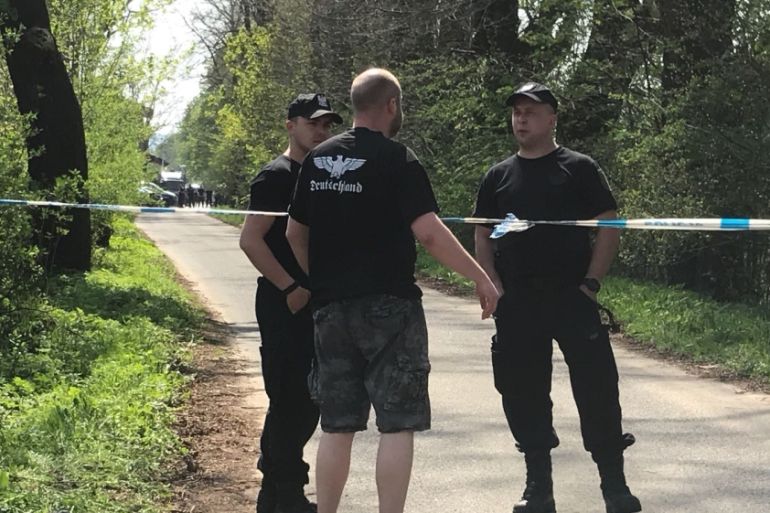German town on alert as neo-Nazi festival, counter events held
Anti-fascists and local council hold separate events in Ostritz in response to far-right festival on Hitler’s birthday.

Ostritz, Germany – Over the past two days, the tiny border town of Ostritz was turned into a heavily-securitised zone of compartments where different groups, under the watchful eye of police, descended to celebrate what they found worth defending: Adolf Hitler’s birthday, peace or a world free of fascism.
First, people from several European countries – mainly Germany, Poland and the Czech Republic – were scheduled to attend the “Shield and Sword”, or SS, festival – a two-day event of political speeches and music concerts topped with a mixed martial arts tournament and a tattoo convention.
Keep reading
list of 4 itemsBiden labels Japan and India ‘xenophobic’ along with China and Russia
After deadly attack, Russia’s Central Asian workers report rising racism
‘Feel less and less like playing’: Vinicius Jr in tears over racist abuse
Organised by the ultranationalist National Democratic Party of Germany, the festival began on Friday, the 129th anniversary of the German Nazi leader’s birthday.
Thanks to freedom of assembly guaranteed by Germany’s constitution, the event was organised in accordance with German law.
In response, the local city council, dominated by the conservative Christian Democratic Union, decided to host a Peace Festival on the main square of Ostritz, a sleepy town with less than 2,500 residents just off the Polish border.
The apolitical event, featuring life music, family entertainment, food and beer, was meant to send a message of protest against the far right and show that the town would not succumb to Nazi pressure.
“We want to show that protest against neo-Nazism and right-wing extremism is not only something for small left-wing groups, but that we do it across parties, across churches, with different associations, clubs, charities, NGOs, and citizens,” Michael Schlitt, the Peace Festival’s co-organiser, said during a press conference.
For local anti-fascist groups, however, the Peace Festival was not enough.
Therefore, with the help of peers from cities in Germany and abroad, the local left organised the “Right does not rock” concert.
A large field in the town centre filled up with people in dreadlocks, anti-fascist music and tents, as well as stalls with food, clothes and posters sending a message of peace and tolerance.
The three events, each located within a short walking distance from the other two, and each representing a radically different esthetics, dominated the town’s space.
Ostritz streets, carefully monitored by the police, including special anti-riot units with reinforcements coming from other German regions and Poland, became an arena of struggle for visibility between the far right, the far left and the bourgeois German conservatism.
On the edge of the town, known for its medieval St Marienthal Abbey and renewable energy, there is a small bridge on the Neisse river, which connects Ostritz with the Polish village of Krzewina.
The river marks the border between the two European countries. People crossing it may not realise they are entering a different state.
![The peace festival held in Ostritz's main square [Agnieszka Pikulicka-Wilczewska/Al Jazeera]](/wp-content/uploads/2018/04/e84b992dbf694de3ac37686e3a633a47_18.jpeg)
ID checks at Polish border
These past two days, however, things looked differently. A tiny forest road which leads to the bridge was closed off for car traffic and a large patrol of Polish police was conducting ID checks for those wishing to cross the border.
On Saturday midday, the police closed the road even for pedestrians.
The reason was clear: to make it more difficult for the far right to enter the SS festival. Over the course of Friday and Saturday, police officers monitored closely the movement of the neo-Nazi groups to prevent them from causing trouble, including clashing with the anti-fascist groups.
Thanks to a city-imposed ban on drinking alcohol in the premises of the Neisseblick Hotel, the festival’s venue, far-right sympathisers wearing black t-shirts with ultranationalist slogans such as “Aryan Brotherhood” or “Germany for us, Germans” wandered around the town’s streets in search for drinks, making their presence felt in the surrounding areas.
“Most people from Ostritz are afraid. Especially those 60-plus are worried what will happen in the night, that there will be clashes between Antifa and the fascists,” said Anna Dittrich, an Ostritz resident from Me-o-wa association.
As of Saturday evening, clashes had not occurred, but a number of times thick police cordons stood between groups of Nazis and angry Antifa protesters who exchanged insults.
“For the Nazis, it is about controlling the space and they have succeeded,” said Jadwiga, a young anarchist from Poland.
“They can go wherever they want, while we were initially stopped from entering the town and told that the mayor does not want political symbols on his picnic”.
After two days of festivals, political statements and protests, it is yet unclear which side proved its point in the most decisive way. While the forces opposing the SS festival outnumbered the neo-Nazis, the very presence of the latter shaped the course of events.
Moreover, while the National Democratic Party may seem fragmented and marginalised – especially due to the rise in prominence of the right-wing Alternative for Germany (AfD) party, which scored 12.6 percent of the vote in the latest elections – the SS event suggested that the party was changing its strategy.
“The concept of ‘Shield and Sword’ highlights one important innovation: the festival can be seen as the first attempt to connect a variety of aspects of neo-Nazi subculture. In our eyes, the event in Ostritz will be the place where German neo-Nazis will meet to solidify and extend their cooperation with members of the Czech and Polish neo-Nazi scene,” Sascha Elser, the organiser of the “Right does not rock” festival told Al Jazeera.
“All under the protective eye of the German and Polish police. If neo-Nazis are able to gather and celebrate Hitler’s birthday without any interruptions, there is something fundamentally wrong,” added Elser.